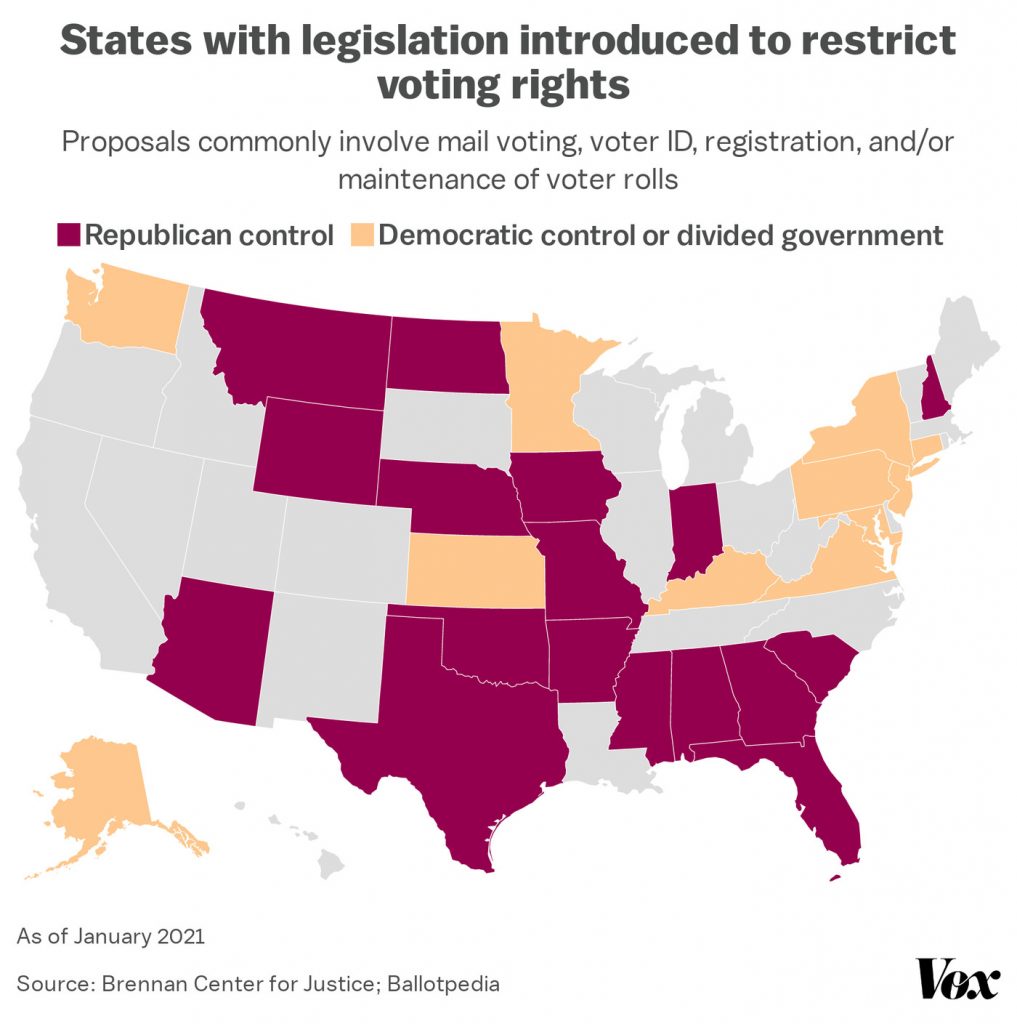
Republican state legislatures in 38 states, including Arizona, Florida, Georgia, South Carolina and Texas have introduced an unprecedented number of bills that restrict voting, citing Trump’s lies about voter fraud. The majority of these bills target disenfranchised voters.
According to Kat Calvin, founder of Spread the Vote, an organization aimed at providing voters with voter I.D.s in states with strict voter I.D. laws, there has been a significant amount of progress of automatic voter registration and absentee voting. In some states where voters are automatically registered to vote, there has been a substantial increase in voter registration. The expansion of absentee voting due to COVID-19 has also considerably increased voter turnout.
Despite measures taken to safeguard elections and protect voters, tactics to disenfranchise voters remain prevalent in America today by introducing these new vote suppressing bills.
Measures in the bills include states requiring proof of citizenship upon registration, cutting election day registration, reducing polling places and prohibiting the use of ballot drop boxes. These restrictive measures heavily target marginalized voters where polling places are limited and crowded, making it harder to vote.
Some of these voters include Charlye Jackson, a student at Howard University who believes these forms of suppression are a response to fear of losing power.
“Republicans are threatened by the power the youth has in our vote,” said Jackson.
Tammy Virgil, an associate professor at Boston University, explains that these measures are nothing new, but the drive to suppress the vote has been strengthened in 2021. Today’s attempts aim to stop voting rights in languages to avoid making racial prejudice clear. In contrast, the specific groups of people they intend to curtail registration do not take long to identify.
Historically, voter suppression has always been at the heart of the American electoral process. Voting rights were restricted to property-owning white men. After reconstruction, Congress adopted several constitutional amendments to protect the freedom of once-enslaved African Americans. However, many states quickly began to curtail these new privileges.
A campaign of intimidation was initiated by the Mississippi Democrats, who brought White Democrats back to power. Tactics, including poll taxes and assessments on literacy, expressly intended to lock out Black voters who were refused the schooling and economic opportunity necessary to overcome these obstacles.
Southern states then began implementing their draconian legislation known as Jim Crow laws, which combined continuing brutality and coercion to curb the Black vote.
To address legal obstacles at the state and local levels that prohibited African Americans from voting, President Lyndon B. Johnson signed the Voting Rights Act in 1965. The bill was viewed as one of the most comprehensive pieces of civil rights legislation. The act resulted in massive voter turnout in the south.
Years after the passage of the Voting Rights Act, the United States government has been working on expanding further and protecting voting rights. From safeguarding the right to vote and securing the rights of non-English speaking voters to making polling sites more available to seniors and disabled persons.
A coalition of Democratic senators sent a letter to Biden advising him to use his executive authority to extend voting rights guarantees and increase oversight of campaign-finance abuses.
Specific proposals by senators include: increasing electoral protection under the Voting Rights Act, pressing the FEC and the DOJ to provide urgency to the prosecution of campaign funding and voting rights violations, extending access to ballots for imprisoned voters and persons with disabilities, requiring states to do more to assist voters and reinforcing penalties on foreign players who intervene in American elections.
Federal laws to nationalize fundamental electoral security, as laid down in H.R. 1, can replace these states’ measures. But, as in the Jim Crow era, the Senate filibuster’s presence stands in the way of guaranteeing federal fundamental voting rights.
Similar to the past, our democracy remains threatened by undemocratic forces that led to the events on Jan. 6. With one party fighting to break the most fundamental principle of democracy—ballot access.
At the state level, Republicans are defending laws that are disproportionately excluding marginalized voters who don’t usually vote for their candidates. At the national level, the party is actively mocking the fundamentals of democracy.

